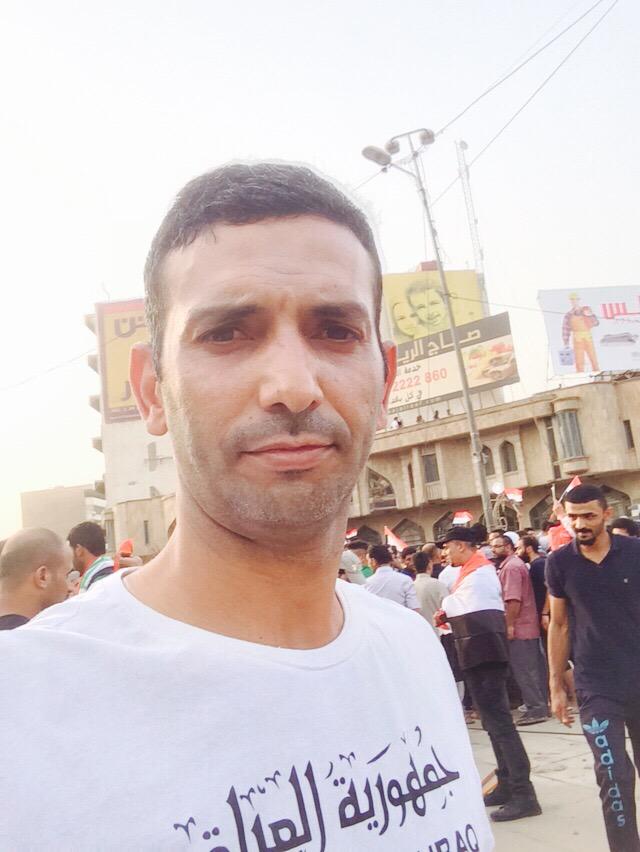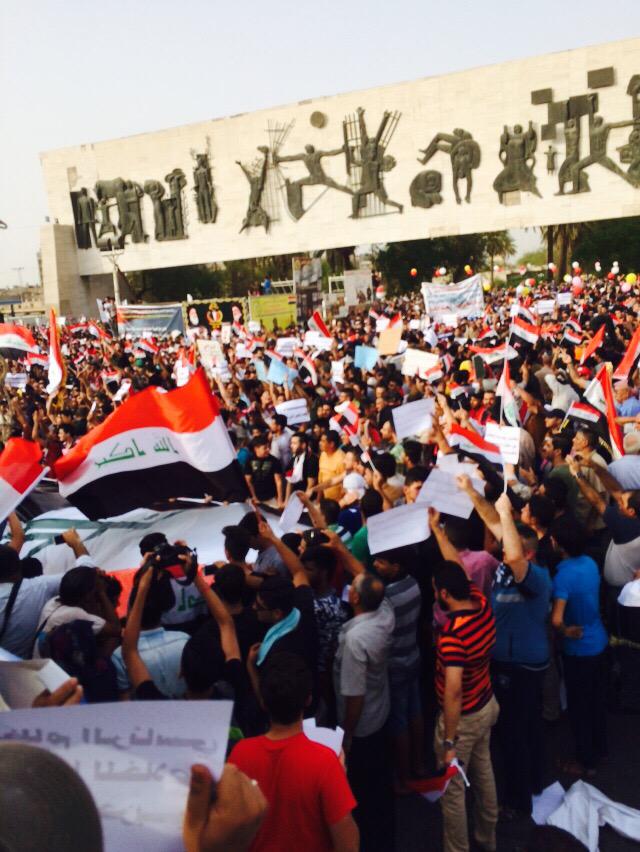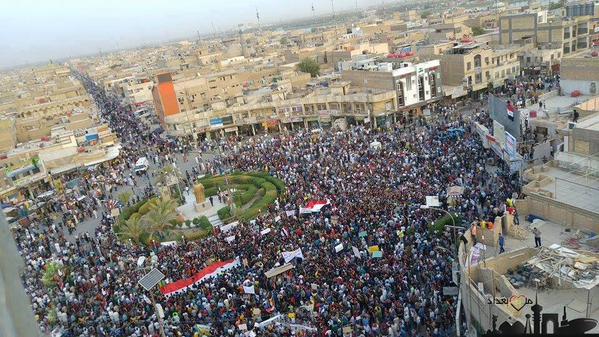Isaiah's The World Today Just Nuts "Justice for Hillary Goose Girl Style" went up Sunday.

Yes, Hillary should have to endure everything she said Ed Snowden deserved.
Remember, she said "Knowingly or unknowingly."
So it doesn't matter if she didn't know that she was sending classified information out across an unsecured server.
Meanwhile read these two Tweets.
And that's why Jane Arraf is the whore of Baghdad.
Always whoring for whomever is in charge -- Saddam, Nouri and now Haider.
Here's C.I.'s "Iraq snapshot:"
Starting with violence as Diyala Province is rocked by two bombings. Deutsche Welle notes, "According to Reuters news agency, IS also claimed responsibility for Monday's twin attacks - one near the provincial capital of Baquba, where a suicide car bombing killed over 30 people and wounded more than 70. The second attack occurred in the village of Kanaan, where officials said another suicide attack killed 7 people and wounded 15." Reuters counts 58 dead.
AFP adds, "The blasts targeted mostly Shiite areas and came less than a month after a massive suicide attack left at least 120 dead in Khan Bani Saad, also in the eastern province."
Throughout Iraq today, Margaret Griffis (Antiwar.com) counts 221 dead.
Griffis is noted at the start of Dahr Jamal's latest garbage.
Here's the link to Dahr's crap.
Ray McGovern?
That's what we're doing at this late date?
Pretending that the CIA has a place in a left movement?
Or that Barack's love slave has anything to say worth hearing?
It's 2015.
If you're going to write about Iraq and you can't go beyond Bully Boy Bush and 2008, find another topic, you're just humiliating yourself.
And again, if you're using CIA filth, you really need to sit your tired ass down. There is no place on the left for an embrace of the CIA. None.
While we're on stupid . . .
Bill Van Auken.
Barack Obama has wrongly presented the options as back his deal or have war with Iran.
If Bully Boy Bush had done that, we'd call it the fear mongering that it is. But Bill's all giddy with Barack just told us what's really going on and . . .
Just go to the bathroom and remove your soiled underwear.
Honestly, you're embarrassing yourself.
That goes for Michael Whitney who argues that Donald Trump is being attacked by the press because he told some truth in Thursday's GOP debate when he said he donated money because it meant, two or so years later, he could ask politicians for favor.
No, Donald Trump is being attacked because he's a sexist pig and this is nothing new -- either for Donald Trump or for the press.
Like Bill Van Auken, Michael Whitney's allowing his own desires to color reality.
And while they jerk off to their fantasies, just like Dahr Jamail, they miss everything that's going on in Iraq today.
Such as the protests these last weeks.
In Defense of Marxism quotes Iraqi Lamia Fadhil on participating in Iraq's recent wave of protests, "For more than 10 years the government didn’t provide anything for us. No electricity, no services and no jobs. That’s it. We've had enough."
And the protests, initially hailed as a "warning sign" by Prime Minister Haider al-Abadi, have had an impact. Sunday, Omar al-Jawoshy and Tim Arango (New York Times) reported:
Facing widespread protests against government corruption and poor services as well as calls for change by Shiite clerics, Prime Minister Haider al-Abadi on Sunday proposed a series of drastic reforms that could be a turning point in the dysfunctional politics of Iraq that have persisted since the U.S. invasion in 2003.
Al-Abadi’s proposals, which came as the war against Islamic State group extremists has stalled in western Anbar province, were wide ranging. They included the elimination of three vice-presidency positions, largely ceremonial jobs that come with expensive perks, and the end of sectarian and party quotas that have dominated the appointments of top officials.
Al Bawaba reports:
It does away with the positions of vice-president and deputy prime minister, among other things.
The move comes following two weeks of countrywide demonstrations to protest government corruption and demand improved public services.
Per In Defense of Marxism, this is the seven-point plan Haider is proposing:
“1) Complete & instant waning of security personnel for ALL high officials, & redirecting all security personnel to the Ministry of Defense to be trained & defend the country on the forefront.
2) Rescinding all exclusivity (in terms of treatment, priority, etc.) allocated to high government positions, including retired personnel.
3) A ban on the application of a quota system on high positions in Ministries, Independent Commissions, advisors, etc. The PM will form a committee to oversee the sacking of unqualified personnel, and their replacement on the basis of merit.
4) Condensing ministries and institutions to raise qualification & efficiency standards, as well as cost reduction.
5) Dissolving the positions of Deputies to the President, and to the Prime Minister immediately.
6) Revisiting old and current corruption cases under the supervision of a High Commission to fight corruption, comprised of experts, as well as appointing judges to oversee these cases known for their untainted integrity.
7) A call to the Cabinet of Ministers, then Parliament, to approve these measures, in order for the Prime Minister to respond to the people’s demands made through the Marja’iya or High Religious Establishment’s [in Najaf].”
Though the Cabinet approves, they do not have the last word and, today in Iraq, Haider's proposals were debated. All Iraq News notes Speaker of Parliament Saleem al-Jobouri states that the "reforms are good but not enough." AFP reports the Speaker is calling on Haider to fire various ministers and an unnamed source tells AFP the list includes, among others, the Minister of Electricity. In an update, AFP also notes, "Juburi also called for MPs who are absent for more than a third of the time to be removed."
Meanwhile, Iraq Times reports that former prime minister and forever thug Nouri al-Maliki is smiling publicly at the reforms but working behind the scenes to dismiss Haider al-Abadi from the Dawa political party. There is also talk that Nouri may be attempting to leave Iraq and there may be an order in place to prevent him from flying out of Baghdad International Airport.
The possible escape is floated as Iraqis demand accountability for the eight years Nouri was prime minister, for the eight years of no improvements in public services while the billions disappeared, the lack of electricity while Nouri's previously unemployed son purchased properties throughout Europe including in London, the lack of potable water while Nouri's previously unemployed son stocked up on expensive cars. Protesters have noted that Nouri presided over 130 billion dollars during his tenure from 2006 through 2014 and they want to know where the money went?
There are rumors that Haider al-Abadi has a list of figures who will be charged with corruption and that Nouri al-Maliki is on that list.
Were Nouri to attempt to leave Baghad and be stopped at the airport that would be fitting since he steered the nation into chaos by persecuting Sunnis including Sunnis politicians and, as soon as the bulk of US troops pulled out of Iraq in December 2011, he was stopping Sunni politicians Tareq al-Hashemi (Vice President of Iraq) and Saleh al-Mutlaq (Deputy Prime Minister) as they attempted to visit the Kurdistan Regional Government.
Alsumaria reports Nouri is again likening peaceful protesters to terrorists and insisting that the demonstrators must be supervised and controlled by security forces because they will likely turn to violence.
All Iraq News quotes Deputy Prime Minister Bahaa al-Araji declaring today, "I will put all those who accused me of corruption under my foot." He's going to need a really big foot.
Ahmed Rasheed, Saif Hameed, Stephen Kalin and Robin Pomeroy (Reuters) report al-Araji "resigned on Monday and will be investigated for corruption, officials said, the first tangible result of Prime Minister Haider al-Abadi's push to tackle corruption in the face of mounting unrest." al-Araji has been an elected member of Parliament since 2006 and is part of Shi'ite cleric and movement leader Moqtada al-Sadr's bloc in Parliament.
Iraq Times reports that al-Araji, in his resignation letter, stated he was resigning at the request of Moqtada while Al Mada states that the travel ban imposed on al-Araji was put in place by Moqtada. In addition, Alsumaria notes that Moqtada is calling for protests if the reforms are not implemented.
Iraq Times quotes Vice President Ayad Allawi stating that he has had his resignation ready for the last four months and that he believes early elections are the only answer.
Iraq is due to hold Parliamentary elections in 2018. Early elections, if Iraq moved on this today, would most likely take at least six months (more based on past history) which would mean they would be held in early 2016.
Apparently Brookings is no longer in the business of analysis.
Instead, they've branched out into the field of gushing as evidenced by Luay al-Khatteeb's latest nonsense which includes:
Abadi's announcement on the 9th of August to institute a series of unprecedented reforms including the cancellation of some of the most senior positions in Iraq's Federal system, in a bid to end the sectarian quota-system, marks a potential watershed in Iraq's political history and its future.
If Abadi's gamble pays off, the 9th of August 2015 may in hindsight be remembered as a momentous day in Iraq's history, to outweigh the eventful regime change of the 9th of April 2003.
In hindsight this might be momentous!
Keep it in your pants, Luay, no one wants to see it.
Not everyone sees rainbows flowing from Haider al-Abadi's butt. Tariq Alhomayed (Asharq Al-Awsat) offers warnings:
The concerns regarding Abadi’s decision are obvious. Iraq is drowning day-by-day in sectarian strife and tension, especially in light of the increasing marginalization of Sunnis in the country. This may lead Iraq down a path where the existing problem of Sunni and Shi’ite extremist groups becomes an even more disastrous problem. Certainly, few will mourn Nuri Al-Maliki’s departure from his position one of the country’s three vice presidents, but that does not mean that this latest move by Abadi comes armed with any specific mechanisms for its implementations or even guarantees that it will hold water. It is, then, hard to see how these measures will help abolish sectarian quotas for posts and safeguard the rights of all Iraq’s different religious and ethnic groups. This last point is especially salient since it was Abadi’s government that refused to arm Sunni tribal groups in the country fighting the Islamic State of Iraq and Syria (ISIS), not to mention the uncertainty still surrounding proposed plans to reinstate Iraq’s Republican Guard and the lack of trust between Abadi’s Baghdad government and the Kurds.
The truth is that everything that has happened in Iraq since the fall of Saddam Hussein points to a complete lack of trust between all of the country’s different religious and ethnic groups. Successive post-Saddam governments have all failed to properly solve the issue of sectarian quotas and cronyism, so why should Iraqis believe this latest move by Abadi will adequately address the problem? Why shouldn’t Iraqis believe that by canceling the posts Abadi is effectively turning into a new Maliki? Would Abadi ever allow a Sunni or Kurdish prime minister to form their own government in future, without him seeking to block those efforts for sectarian reasons or through an Iranian veto—as happened when the Shi’ite Nuri Al-Maliki regained his position as prime minister in 2010 despite losing the elections to Sunni candidate Iyad Allawi? In the absence of genuine political discourse and a national reconciliation process there are in truth no guarantees that Abadi is being sincere with this latest move. And, given everything that has happened recently in Iraq, it is extremely difficult to rely solely on (what may seem to be) good intentions. After all, the road to hell is paved with them, as the saying goes.
Iraq Times reports Vice President Osama al-Nujaifi gave an interview to the BBC in which he stated that Haider was attempted to bypass and overturn the Constitution with these reforms or 'reforms' which the Constitution does not grant Haider the power to implement.
It's amazing how little attention has been given for what Haider's proposal, if implemented, means two weeks or two months on down the line.
Now it's more than worth again revisiting Ibrahim Saleh's February report for Niqash:
Recently there have been calls for major
changes to the Iraqi political system, moving it from a parliamentary
system to a presidential one. This would mean that rather than elected
MPs in Baghdad choosing the country's President, voters would choose the
President, who could then work somewhat separately from the
also-elected Parliament. For example, the US is a presidential system.
Iraq currently has a parliamentary system.
However politicians in Iraq are concerned
that if this comes any closer to happening that it will be a way for
former Prime Minister Nouri al-Maliki to slip back into power, but this
time through a legal back door. They are also concerned that while it
may not be something that can happen immediately, there is potential for
some changes to occur during the next elections.
The call for these changes were started by
one of the Shiite Muslim militias involved in the fight against the
extremist group known as the Islamic State. The group, League of the Righteous, or Asaib Ahl al-Haq in Arabic,
is known to be closely linked with al-Maliki. It is also known to be
one of the more hard line and extremist of the Shiite militias.
Which is why many local politicians saw
this as a call to bring al-Maliki, who is currently somewhat sidelined
as one of Iraq's three Vice Presidents, back to power. Al-Maliki's
divisive policies and attempts to centralise power have taken a fair
share of the blame for the country's current security crisis and,
although his party was successful in the last elections, al-Maliki lost
the post of Prime Minister to colleague, Haider al-Abadi late last year.
At today's State Dept press briefing, spokesperson John Kirby moderated a bit on Iraq which mainly (see first exchange) revealed how little the press is paying attention to Iraq.
QUESTION: Iraq?
MR KIRBY: Yes.
QUESTION: So about Prime Minister Abadi’s reform initiatives, he has removed two of his deputies and two vice presidents, including former Prime Minister Maliki, from power. What is the U.S. take on that? Is it good for the country at a time when it’s fighting the Islamic State?
MR KIRBY: Prime Minister Abadi has presented a proposal to streamline the Iraqi Government. We note that these measures were unanimously approved by the Council of Ministers. This is an internal Iraqi matter, but we do commend Prime Minister Abadi’s initiative to promote improved government services and transparency.
Please.
QUESTION: So one more thing about – inside Iraq but inside, actually, the Kurdistan region.
MR KIRBY: Say again?
QUESTION: Inside the Kurdistan region in Iraq, there is another crisis going on nowadays. And according to the experts, this crisis over the presidency of Kurdistan has reached a particularly dangerous level with the opposition parties stressing that president should not seek a third term, and he’s not willing, apparently, to not seek a third term. And --
MR KIRBY: You’re talking about President Barzani?
QUESTION: President Barzani, yes. So isn’t that – like aren’t you worried that this region, which is very important in your fight against Islamic State, might destabilize as a result of this internal leadership crisis?
MR KIRBY: Well, I’m not going to – as I said to your first question, I’m not going to talk about internal political matters inside Iraq. I think broadly speaking, Iraqi political leadership understands the threat that ISIL poses to them and to the Iraqi people, and we’re going to continue to work with the Government of Iraq to deal with the threat that they face. So I think I’d leave it there.
QUESTION: Has the United States – I know Mr. Brett McGurk was in Kurdistan, I think yesterday. Has the United States been in touch with the Kurdish officials over this specific issue, the crisis over the presidency?
MR KIRBY: We don’t ever talk about the details of diplomatic conversations. Ambassador McGurk is in Iraq to have a wide range of meetings and discussions with Iraqi leaders about how we can all work together to combat and to degrade and defeat ISIL inside Iraq.
QUESTION: Just one more, John. Sorry. Today, actually, there are media reports that the ruling party, which is the KDP, has – had moved its armored vehicles and its armed forces inside the capital Erbil, as basically a deliberate attempt to show muscle inside the capital at a time when the region is facing this leadership crisis. Aren’t you worried while you’re arming, of course, the Peshmerga, which is an effective force against ISIS in the ground, that this – what these weapons might – might be used in domestic struggles by the Kurds?
MR KIRBY: Well, I’m not aware of the events that you’re detailing there. I’d just go back to what I said before. I think we’re certainly comfortable that leaders in Iraq share the same sense of urgency and purpose that we do about the threat ISIL poses internally to Iraq and the Iraqi people but also regionally, and frankly, they’ve got aspirations beyond the region. I think everybody has that same shared sense of purpose, and that our – that we are as a coalition directing our energies, our efforts, our resources, against that threat. And everybody understands that that’s the threat that’s most important right now.
QUESTION: Thank you.
QUESTION: Could I have a quick follow-up, please?
MR KIRBY: Sure.
QUESTION: On the Iraqi reform package by Prime Minister Abadi, I know you don’t want to talk about the Iraqi internal issues, but from this building you have said many times that the problem of ISIS and the Iraqi issue is not only security, it is also the problem of governance that led to the ISIS unfolding.
MR KIRBY: Right.
QUESTION: And also even President Obama said that --
MR KIRBY: Right.
QUESTION: -- several times. So do you think this reform package is part of the plan that you are hoping that Prime Minister Abadi will fix the governance problem, or this is something else, you don’t support it?
MR KIRBY: I applaud you for a very deft attempt to try to get me to actually go ahead and comment on internal Iraqi politics. (Laughter.) It was a very well-constructed question – (laughter) – that I am going to not answer. (Laughter.)
Look, these are internal Iraqi matters. But as I said at my outset, we certainly commend Prime Minister Abadi for the initiative that he’s taking to promote government – to promote improved government services and transparency. I mean, he has really moved with alacrity to try to get at better governance inside Iraq, to be more inclusive, to be more responsive to the Iraqi people. And nothing changes about what we’ve said before about the importance of good governance in Iraq and, frankly, in Syria with respect to permanently being able to sustain a defeat of ISIL.
QUESTION: Okay, one more on Kurdistan. I just want to follow up on what Namo said. Actually, Ambassador McGurk and Ambassador Jones, they were meeting with the Kurdish officials over the weekend, specifically on Saturday, and they have discussed, actually, the issue related to the President Barzani. I do have a response from Ambassador McGurk’s office about that, but I just want to have a clear answer about that, if there is something United States want to favor in – to say in the favor of President Barzani that he – that they want to stay – President Barzani to stay because of the ISIS effort, or this is something you don’t want to talk about it?
MR KIRBY: I’m not going to get into the details of conversations. I mean, these are internal Iraqi political issues that the United States is not going to insert ourselves into. But you’re right; Ambassador McGurk did meet with President Barzani and other leaders there. He reaffirmed the U.S. commitment to continued cooperation with Iraqi Kurdish forces in the fight against ISIL, and he commended KRG officials for their coordination with the Government of Iraq and coalition members in that same fight, and he praised the contribution of Peshmerga forces.
QUESTION: One last on Iraq and Iran. On the – over the weekend and also that other – last week, I think, also, that Iranian, I don’t know, spy, whatever, intelligence, tried to assassinate one of the Iranian Kurdish opposition leaders in Iraq. And two days ago, one of the Iranian spy also was captured by the Iranian opposition leaders in Sulaymaniyah that he was trying to plant 20 kilograms of TNT in their headquarters where there are civilians also living there.
Moving to the topic of Iran, Vets Against The Deal has released a video opposing Barack's proposed deal. The video features Iraq War veteran Staff Sgt Robert Bartlett.
Josh Rogin (Bloomberg) covers the group here and notes:
Retired Gen. Mike Flynn, director of the Defense Intelligence Agency during Obama’s first term, is an adviser to the group. He said soldiers by and large weren’t advocates of the war in Iraq, but were simply called on to serve and did their duty. But now, many of those individuals are veterans, and they want to have a say.
"They have a right and a responsibility to speak up,” Flynn said.
iraq
al mada
al jazeera
 jane arraf
jane arraf
 Hayder al-Khoei
Hayder al-Khoei

 Methaq Al -fayydh
Methaq Al -fayydh


 Ammar karim
Ammar karim


 Nader Uskowi
Nader Uskowi

 #IRAQ شمرية العراق
#IRAQ شمرية العراق




 LEWIS
LEWIS



